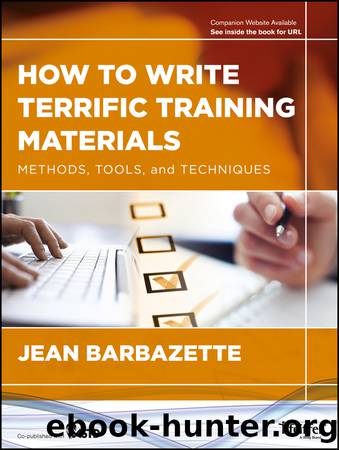How to Write Terrific Training Materials by Barbazette Jean;

Author:Barbazette, Jean;
Language: eng
Format: epub
Publisher: Center for Creative Leadership
Published: 2013-02-23T00:00:00+00:00
How to Write Terrific Training Materials. Copyright © 2013 by John Wiley & Sons, Inc. Reproduced by permission of Pfeiffer, an Imprint of Wiley. www.pfeiffer.com.
Click here to access this Tool on the website.
Tool 6.7. Checklist for Designing Your Own Game
1. Write behavioral objectives.
2. Decide whether a game is the best method to meet the learning objectives.
3. Determine what kind of format for the game is best (puzzle, exercise, board game, etc.).
4. Review existing resources.
5. Follow selection/evaluation suggestions in Exhibit 6.5.
6. Write the learning point you want to make.
7. Identify the learnersâ motives to participate in the game.
8. Identify those who might resist involvement in the activity. What is the source of the resistance and how will you overcome it?
9. Identify how much risk is involved for the learners.
10. Create the instructions needed to introduce the game.
11. Identify characters, situation, or setting for the game.
12. Decide what participants do to meet the objective (look at a picture, answer questions, discuss learning points, come to consensus, interview each other, write thoughts for reflection, etc.).
13. Write instructions to read in class or for the learners to read themselves.
14. Estimate the time to âplayâ the game sufficiently to develop learning points.
15. Determine whether there a balance between learning and fun and between skill and luck.
16. Make the rules clear and easy to follow. Define what a player can or cannot do, how a score is kept, and what constitutes winning the game.
17. Use tokens or game pieces that are familiar and easily available.
18. Write questions to process the game using the five steps of adult learning.
19. Estimate the time to process the game.
20. Obtain feedback on design of the game from peers.
21. Test run or pilot the game with a target audience.
22. Evaluate to what extent the game objectives were met.
23. Identify learning points made that you did not anticipate.
24. Identify changes and/or variations for next time.
Download
This site does not store any files on its server. We only index and link to content provided by other sites. Please contact the content providers to delete copyright contents if any and email us, we'll remove relevant links or contents immediately.
HBRâs 10 Must Reads for Executive Teams (with bonus article âLeadership That Gets Resultsâ by Daniel Goleman) (for True Epub) by Harvard Business Review(479)
Python for Finance Cookbook by Lewinson Eryk;(440)
Empowering Public Speaking by Deanna L. Fasset & Keith Nainby(407)
Doing business with Japan : successful strategies for intercultural communication by Kazuo Nishiyama(392)
Global Orders and Civilizations : Perspectives from History, Philosophy and International Relations by Sadik Unay; Muzaffer Senel(323)
Engaging with Ethics in International Criminological Research by Michael Adorjan Rose Ricciardelli(281)
The Future Internet by Bernard Marr(260)
Intentional Power: The 6 Essential Leadership Skills For Triple Bottom Line Impact by Lisen Stromberg & JeanAnn Nichols & Corey Jones(259)
Analysis of Financial Statements by Frank J. Fabozzi & Frank J. Fabozzi(254)
The Economics of Banking by Jin Cao(252)
The Three Skills of Top Trading by Hank Pruden(250)
Entrepreneurial Marketing by unknow(243)
The Oxford Handbook of Banking and Financial History by Youssef Cassis;Richard S. Grossman;Catherine R. Schenk;(235)
Focus on Teaching by Jim Knight(233)
Data Science and Analytics for SMEs: Consulting, Tools, Practical Use Cases by Afolabi Ibukun Tolulope(220)
Building a Career in Cybersecurity: The Strategy and Skills You Need to Succeed by Yuri Diogenes(219)
Financial Statement Analysis by Martin S. Fridson;Fernando Alvarez; & Fernando Alvarez(216)
New India by Arvind Panagariya(215)
Maximum Success with LinkedIn by Dan Sherman(191)
